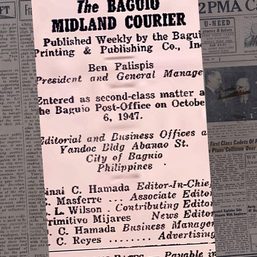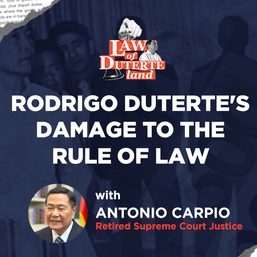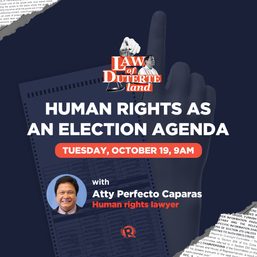SUMMARY
This is AI generated summarization, which may have errors. For context, always refer to the full article.
![[PODCAST] Law of Duterte Land: Memory law of Marcosian atrocities to #neverforget](https://www.rappler.com/tachyon/2021/09/Law-of-DuterteLand.jpg)
In Germany, there is a punitive memory law that criminalizes denial of the holocaust.
Is it time for the Philippines to pass its own memory law that would prohibit denial of the atrocities of the Marcosian Martial Law?
Lawyers Raphael Pangalangan, Gemmo Fernandez, and Ross Tugade discussed it in their 2018 paper, “Marcosian Atrocities: Historical Revisionism and the Legal Constraints on Forgetting.”
“There are a number of circumstances that need to align, the stars need to align,” said Pangalangan, describing the decades worth of legislations and jurisprudence that recognized the atrocities and even institutionalized recovery and reparation.
It was only in 2013 when the late former president Benigno “Noynoy” Aquino III passed into law Republic Act 10368 that created the Human Rights Victims Claims Board.
“I could imagine how difficult the road must have been to even have that law proposed in the first place. The fact that there is the HRVCB is nothing short of a miracle,” said Tugade.
While a memory law has many free speech implications, Fernandez said it’s still up to Congress if it will have a strict or tempered version, but “these kinds of laws prohibiting denial of atrocities could pass consitutional muster.”
Listen to this podcast for a deeper discussion.
For past podcast episodes:
- Episode 1 Part 1: Supreme Court’s most controversial decisions
- Episode 1 Part 2: Department of Justice’s evolving definition of warrantless arrests
- Episode 2: The rule of law in the time of the coronavirus
- Episode 3: Pandemic and the great wall of free speech
- Episode 4: Will petition to disclose Duterte health work?
- Episode 5: Legal difficulties of a prisoner mass release
- Episode 6: Breaking down the ABS-CBN franchise legal and political issues
- Episode 7: ABS-CBN and the 3 tangled branches of government
- Episode 8: Are extraordinary writs still effective in the time of Duterte?
- Episode 9: Dissecting anti-terror bill and threats to freedoms
- Episode 10: The problems with the Cybercrime Law
- Episode 11: Can we trust the gov’t panel probing drug war deaths?
- Episode 12: Why press freedom is legally protected
- Episode 13: What is People’s Initiative and will it work for ABS-CBN?
- Episode 14: The new push for death penalty
- Episode 15: A State of terror
- Episode 16: GCTA’s thorn – Do bad men deserve good things?
- Episode 17: Policies beyond body count of Duterte’s drug war
- Episode 18: Can we really bring Xi Jinping to the ICC?
- Episode 19: Philippine courts and the death of baby River
- Episode 20: Deep dive into anti-terror law IRR
- Episode 21: Supreme Court and the SALN challenge
- Episode 22: Where PH stands in fight for climate justice
- Episode 23: How to legally fight red-tagging
- Episode 24: Hope for the Rule of Law with Dino de Leon
- Episode 25: Summary of anti-terror law petitions
- Episode 26: May it please the Court – the anti-terror law orals
- Episode 27: Investigating Duterte’s drug war using hard data
- Episode 28: Your Honors, they are killing lawyers
- Episode 29: Choosing who sits on the Bench
- Episode 30: Lugaw, RA 11332, and common sense policy
- Episode 31: Understanding electoral protests
- Episode 32: Captain Ri and all the president’s men
- Episode 33: The law of NTF-ELCAC
- Episode 34: Lawyering under threat
- Episode 35: Duterte’s ICC prospects
- Episode 36: Plunderers and how to get them
- Episode 37: Can Duterte run for VP?
- Episode 38: ICC hopes alive in Supreme Court ‘loss’
- Episode 39: If justice favors the state
- Episode 40: ICC probes drug war. What happens now?
If you have tips and suggestions for episodes, email the host at lian.buan@rappler.com. – Rappler.com
Add a comment
How does this make you feel?
![[Closer Look] ‘Join Marcos, avert Duterte’ and the danger of expediency](https://www.rappler.com/tachyon/2024/06/TL-trillanes-duterte-expediency-june-29-2024.jpg?resize=257%2C257&crop_strategy=attention)

![[Newspoint] A Freedom Week joke](https://www.rappler.com/tachyon/2024/06/20240614-Filipino-Week-joke-1.jpg?resize=257%2C257&crop_strategy=attention)



![[PODCAST] Law of Duterte Land: Is Marcos Jr. liable for P203 billion estate tax?](https://www.rappler.com/tachyon/2022/04/Law-of-DuterteLand-with-ls.jpg?resize=257%2C257&crop_strategy=attention)
![[PODCAST] Law of Duterte Land: Explaining Marcos’ P203-B estate tax debt](https://www.rappler.com/tachyon/2022/03/Law-of-DuterteLand-tcard-LS.jpg?resize=257%2C257&crop=283px%2C0px%2C720px%2C720px)
![[PODCAST] Law of Duterte Land: Scrap Malampaya deal with Dennis Uy – IBP](https://www.rappler.com/tachyon/2021/11/Law-of-DuterteLand-PROMO-ls-1.jpg?resize=257%2C257&crop_strategy=attention)

![[PODCAST] Teach Me, Senpai, E4: TikToks and visual arts with Racobell](https://www.rappler.com/tachyon/2023/09/teach-me-senpai-ls-guest.png?resize=257%2C257&crop=462px%2C0px%2C1080px%2C1080px)
![[PODCAST] Teach Me, Senpai, E3: Gaming and streaming with Noctile](https://www.rappler.com/tachyon/2023/09/teach-me-senpai-ls-guest.jpg?resize=257%2C257&crop_strategy=attention)
![[PODCAST] Teach Me, Senpai, E2: Marketing an environmental movement with #breakfreefromplastic](https://www.rappler.com/tachyon/2023/08/teach-me-senpai-ls-guest.jpg?resize=257%2C257&crop_strategy=attention)

![[PODCAST] Teach Me, Senpai, E1: Beat-building with YouTuber Gio San Pedro](https://www.rappler.com/tachyon/2023/08/teach-me-senpai-ls-guest-1.jpg?resize=257%2C257&crop_strategy=attention)
There are no comments yet. Add your comment to start the conversation.